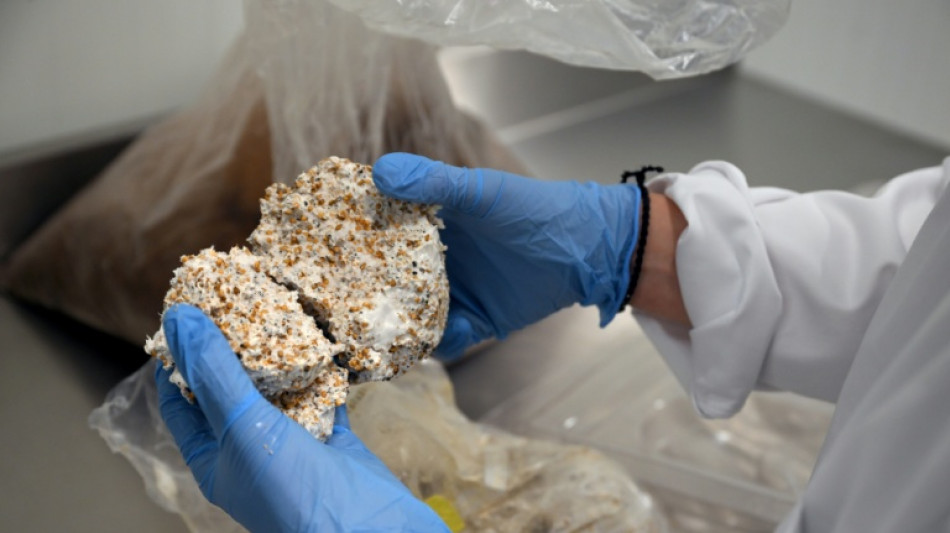

Mushroom material takes on plastic packaging at Belgian start-up
On a gleaming new production line in Brussels, Julien Jacquet shows off a row of milky-white soap bar wrappers -- made by what is billed as Europe's first factory for mushroom-based packaging.
Jacquet's start-up company, Permafungi, pitches its fully biodegradable "myco-material" as a sustainable alternative to polystyrene and other polluting plastics.
"These ones are designed for hotels," he explained to visitors on a recent tour of the site.
Profitability remains a distant goal: so far Permafungi operates in a niche market, crafting custom packaging for high-end soap makers.
But the 12-person company has built a reputation on the green economy scene in Brussels by recycling grounds from local coffee shops to grow edible mushrooms over the past decade.
Now, it is looking to shift up a gear -- opening a new factory to break into the fiercely competitive packaging sector.
Jacquet is highly critical of conventional packaging, often made from petroleum-based materials and shipped from far-flung corners of the globe.
His vision is to "bring the user closer to the packaging" -- using mushrooms sourced from the Sonian forest on the southern rim of the Belgian capital as his starting point.
The process begins with Permafungi recovering waste materials such as sawdust that are discarded by traditional industries.
These are placed into moulds, where mycelium, the root-like structure of fungi, takes over.
Feeding on the waste, the mycelium grows into the desired shape. The result -- a spongy, tofu-textured mass -- is dried, turned out and delivered.
- Scale-up challenge -
"No more petrochemicals to heat and press," said Jacquet. "Here, we just watch the mushrooms grow -- with help from recycled rainwater and machines that speed up production."
Solar panels line the roof, and a wooden bike shed adds to the eco-friendly appeal of the project -- which aligns with upcoming EU legislation requiring all packaging to be recyclable by 2030.
Permafungi has received two million euros in EU funding, along with regional support.
It also secured one million euros from the Swiss private equity fund Apres-Demain, led by pharmaceutical billionaire Thierry Mauvernay.
"The fund wants to support impact-driven companies that use local resources in environmentally respectful ways," said Sebastien Beth, one of its managers.
But Beth acknowledged that Permafungi "needs to be profitable within two to five years" if it wants to keep going.
As it stands, the company is expanding, with new collaborations announced with two wineries, a watch brand and a candle maker. Jacquet is aiming for three million euros in turnover within three years.
Across Europe and the United States, environmental projects using mushrooms have been popping up since the mid-2000s.
"A lot of promises have been made" around alternatives to petroleum-based materials, said Luc Vernet of Farm Europe, a think tank focused on agriculture and food. "The challenge is scaling up and managing costs."
The main obstacle, he said, remains "competition from fossil-based products, especially when oil prices are low."
The EU is expected to unveil a bioeconomy strategy later this month, which will include support for biomaterials.
The stakes are high, with packaging waste a growing source of pollution.
According to EU data, each European citizen generated nearly 190 kilograms of packaging waste in 2021 -- a figure projected to rise to 209 kg by 2030 without further action.
Jacquet also sees his project as a way to reindustrialise an urban area -- with many parts of Europe feeling the strain from decades of factory closures.
Permafungi's new site sits just a few hundred meters from a former Audi car plant, which shut down in February leaving around 3,000 Brussels workers jobless.
S.Vandenberghe--JdB



